First Shipment of the COVID-19 Vaccine Arrives at the Los Angeles Jewish Home


First Shipment of the COVID-19 Vaccine Arrives at the Los Angeles Jewish Home
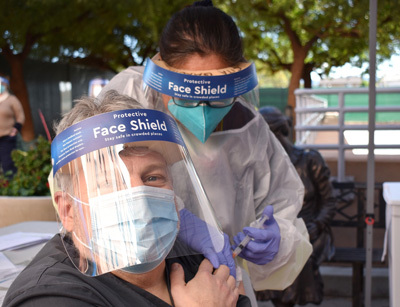
Just before the New Year, after months of heartbreak, worry, illness, and even death—stretching across every country and carried there by an unprecedented pandemic—people were finally given the most precious gift of the holiday season: hope. Weeks ago, the long anticipated news came out that there was emergency authorization for vaccines to beat back COVID-19. On December 30, the first shipments of Moderna's vaccine arrived at the Los Angeles Jewish Home.
Like the Pfizer vaccine, the Moderna vaccine received emergency authorization by the US Food and Drug Administration (FDA). Federal and state officials have designated long-term care residents and staff of senior living facilities as priority recipients of the vaccine, further indicating that those who reside or work specifically within skilled nursing areas should be first to receive it. All others living and working at the Jewish Home are expected to receive their first dose of the two-dose regimen within the coming weeks.
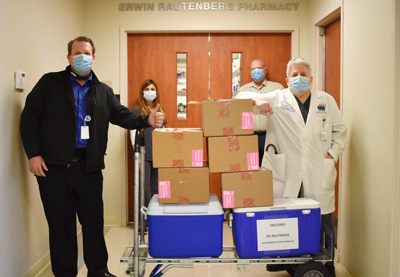
First shipment of Moderna vaccine arrives at the Jewish Home.
Noah Marco, MD, the Jewish Home's chief medical officer, says the arrival of these vaccines is an extremely positive development that will save lives. "Efficiently progressing with immunizations of residents and the staff who care for them will help protect the seniors in our care," he says. "Now that we have begun receiving shipments, I encourage everyone eligible to receive the vaccine to do so. Receiving the vaccine is is extremely important both for the individual receiving it and for the greater community."
Dr. Marco acknowledges there will be some initial hesitation about taking the vaccine, but stresses that people should have confidence in the FDA approval process. "The FDA's official sanction is recognized around the world as the gold standard," he says. "In addition, the safety of the vaccine is continually being monitored to ensure even very rare side effects are identified."
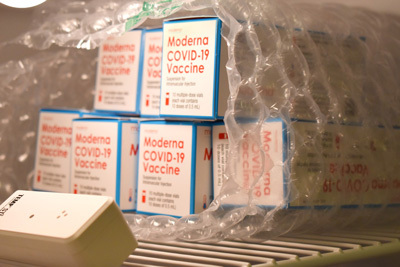
Boxes of the COVID-19 vaccine are unwrapped.
There are only four medical reasons someone should not get the COVID-19 vaccine: if they have had a severe allergic reaction to components of the vaccine; if they are already actively sick with COVID-19; if they have received monoclonal antibody or convalescent plasma treatment in the last 90 days; or if they have gotten any potential contradicting vaccine in the last 14 days.
For everyone else, Dr. Marco says, the universal benefits of the vaccine are clear. "The bottom line is that the vaccine has been proven to work," he says. "I've heard from some people asking whether it might not be better to get the virus naturally and to build up immunity that way, and the evidence against this is indisputable: The data show that natural immunity is simply not as good as immunity from the vaccine."
There are other, equally compelling, reasons to get the vaccine. "Healthy people die from COVID-19, and survivors can experience serious and life-changing medical complications that can significantly damage their brain, lungs, and heart," Dr. Marco says.
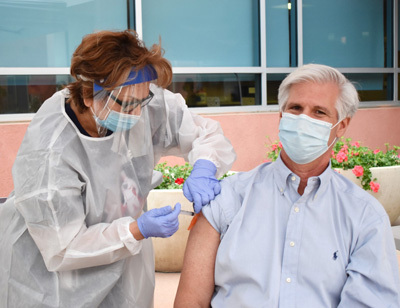
President and Chief Executive Officer Dale Surowitz receives his vaccine at end of the day to encourage others to roll up their sleeves.
Dr. Marco is also emphatic about why getting the vaccine is the responsible thing to do for the broader community. "We all live together in society, and we have a collective responsibility to protect not just our own lives, but also the lives of people we interact with every day," he says. "By getting the vaccine, we dramatically reduce the chances of a person getting the virus and passing it along to someone else. And that means fewer people will die."
As Dr. Marco sees it, this all adds up to one obvious conclusion: getting vaccinated is the right—and best—thing to do. For that reason, he says, he has been repeating the same phrase over and over to anyone who will listen. "It's my new mantra," he says. "Don't hesitate; vaccinate!"
The timeline for administering the vaccine at the Jewish Home is aggressive, and as always, notes Dale Surowitz, the Home's President and CEO, safety and caution are paramount. "We immunized significant numbers of staff and residents over the New Year's holiday, and plan to complete the majority of first phase vaccinations for skilled nursing staff and skilled nursing residents as quickly as possible during January," he says. "Other residents, patients, and staff will be administered the vaccine as soon as the doses are made available, consistent with federal government phasing requirements."
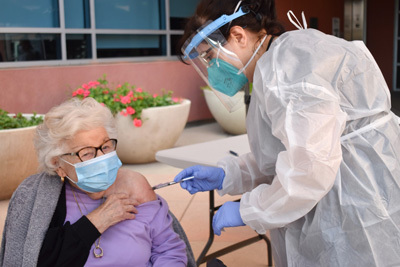
Jewish Home Resident and Holocaust survivor Edith Frankie receives one of the first doses of the Moderna vaccine at the Home
This is exciting news for Jewish Home residents, who have experienced ongoing challenges throughout the past year as a result of important safety precautions that have limited their interactions with others outside of the Home, including direct contact with their own family members. The wait for a vaccine has been long, yet seniors at the Home have borne it with characteristic grace and resilience.
They have also managed to put it all in perspective. Edith Frankie, a survivor of the Nazi concentration camps and a resident at the Jewish Home, says, "This shall pass. People don't like restrictions. Me? I'm used to it. Staying in our rooms is not so hard in comparison."
It is this kind of strong determination that has been on display at the Jewish Home throughout the pandemic. As always, our residents are setting an example for everyone to follow.